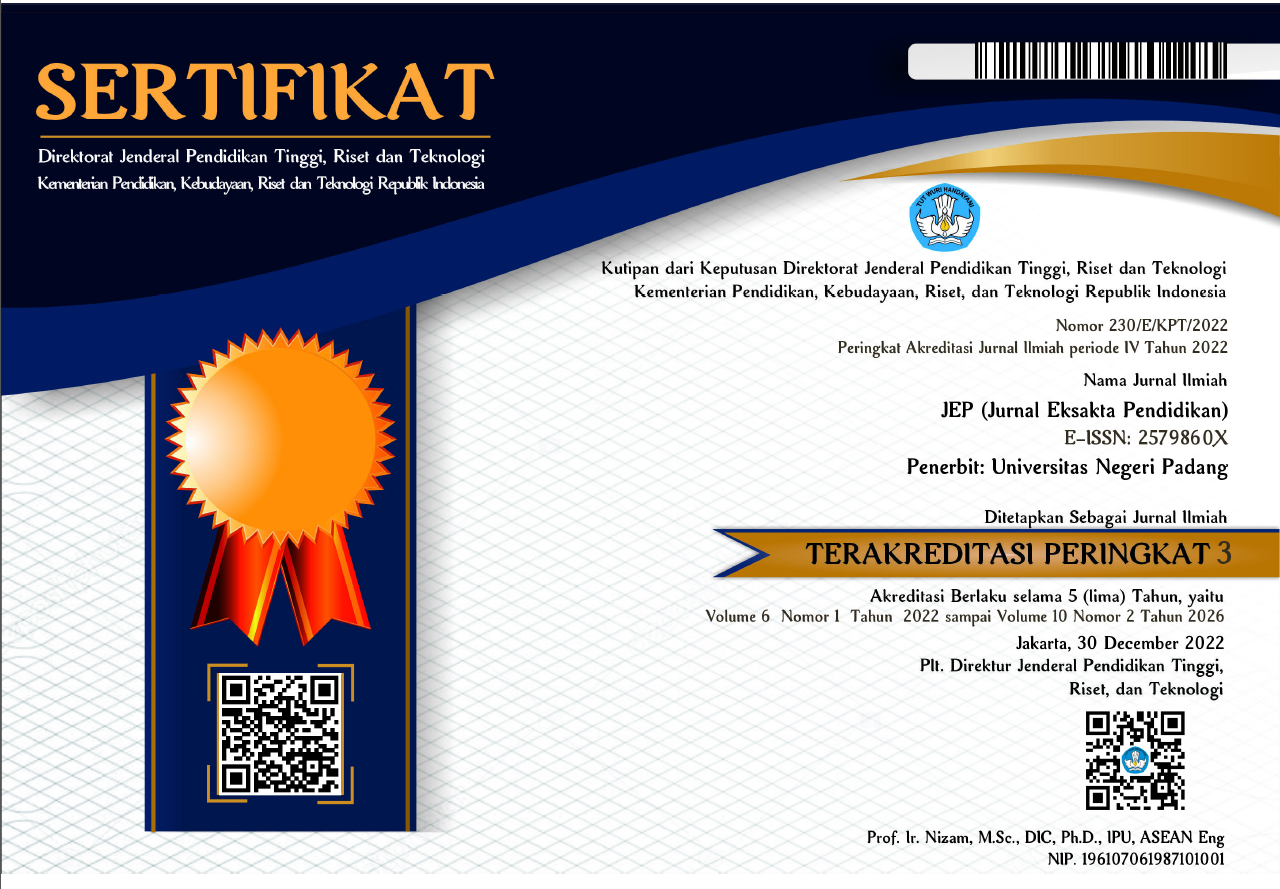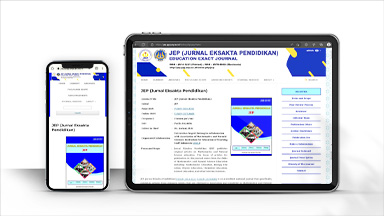Research Trends and Opportunities of Argumentation Based Learning for Solving Problems in Physics Learning : A Bibliometric Analysis
Abstract
Research on argumentation has been widely conducted and continues to develop. Research trends and opportunities need to be known by researchers to conduct research. To find out this, a bibliometric analysis needs to be conducted. This analysis is conducted to determine the development of publications, trends, and research opportunities on the topic of argumentation in Physics learning. Article data was obtained from Scopus and analyzed using the VOSviewer application. The results obtained are that research in this topic tends to increase every year. Keywords that are trending in this topic include high school, physics and science education, e-learning and dialogic argumentation, and argumentation skills. Meanwhile, keywords that are opportunities are higher education, other fields that study Physics, the use of teaching materials and inquiry, assessment in argumentation-based learning, and understanding concepts. In addition, a relationship between argumentation and problem-solving skills was also obtained. There are still few articles that connected argumentation and problem-solving so that this topic can be an opportunity to conduct research, especially at the university level. We suggest exploring various methods in implementing argumentation in Physics learning. Argumentation can not only improve argumentation skills but also improve various 21st century skills such as problem-solving skills
Downloads
References
Admoko, S., Sari, E. P. D. N., Hariyono, E., & Madlazim. (2023). Online discussion in improving argumentation skills during last decade: A review. International Journal of Evaluation and Research in Education, 12(4), 1880–1892. https://doi.org/10.11591/ijere.v12i4.25445
Álvarez-García, L. M., & García-Martínez, A. (2024). Use of historical scientific controversies in the context of physics teaching. A study of the scientific pragmadialectic argumentation at school. Investigacoes Em Ensino de Ciencias, 29(2), 57–83. https://doi.org/10.22600/1518-8795.ienci2024v29n2p57
Antonio, R. P., & Prudente, M. S. (2021). Metacognitive argument-driven inquiry in teaching antimicrobial resistance: Effects on students’ conceptual understanding and argumentation skills. Journal of Turkish Science Education, 18(2), 192–217. https://doi.org/10.36681/tused.2021.60
Bag, H., & Calik, M. (2017). A thematic review of argumentation studies at the K-8 level. Egitim Ve Bilim-Education And Science, 42(190), 281–303. https://doi.org/http://dx.doi.org/10.15390/EB.2017.6845
Belova, N., Eilks, I., & Feierabend, T. (2015). The evaluation of role-playing in the context of teaching climate change. International Journal of Science and Mathematics Education, 13(1), 165–190. https://doi.org/10.1007/s10763-013-9477-x
Bondi, H. (1987). A non-believer looks at physics. Physics Education, 22(5), 280–283. https://doi.org/10.1088/0031-9120/22/5/316
Boscolo, A., Lippiello, S., & Pierri, A. (2024). Storytelling as a skeleton to design a learning unit: A model for teaching and learning optics. Education Sciences, 14(3), 1–15. https://doi.org/10.3390/educsci14030218
Demircioglu, T., & Ucar, S. (2015). Investigating the effect of argument-driven inquiry in laboratory instruction. Kuram ve Uygulamada Egitim Bilimleri, 15(1), 267–283. https://doi.org/10.12738/estp.2015.1.2324
Fan, Y. C., Wang, T. H., & Wang, K. H. (2020). Studying the effectiveness of an online argumentation model for improving undergraduate students’ argumentation ability. Journal of Computer Assisted Learning, 36(4), 1–14. https://doi.org/10.1111/jcal.12420
Flores-Amado, A., Sayeg-Sanchez, G., Amozurrutia-Elizalde, A., De-Oca, S. M., Hernández-Mena, C., Amado-Moranchel, N., Hidalgo-Reyes, J. I., & Zamora-Hernandez, I. (2024). Evidence of effectiveness for AJA strategy to argumentative skills development in engineering students. IEEE Global Engineering Education Conference, 1–6. https://doi.org/10.1109/EDUCON60312.2024.10578601
Hasnunidah, N., Maulina, D., & Rakhmawati, I. (2023). Developing a project-argumentative learning model with blended learning approach for junior high school students. ULICoSS, 990–1000. https://doi.org/10.2991/978-2-38476-046-6_96
Inch, E. (2006). Critical Thinking and Communication. Pearson.
Iwuanyanwu, P. N. (2023). When science is taught this way, students become critical friends: Setting the stage for student teachers. Research in Science Education, 53(6), 1063–1079. https://doi.org/10.1007/s11165-023-10122-9
Juntunen, M. K., & Aksela, M. K. (2014). Education for sustainable development in chemistry-challenges, possibilities and pedagogical models in Finland and elsewhere. Chemistry Education Research and Practice, 15(4), 488–500. https://doi.org/10.1039/c4rp00128a
Lobczowski, N. G. (2020). An exploration of social regulation of learning during scientific argumentation discourse. Contemporary Educational Psychology, 63(1), 1–17. https://doi.org/10.1016/j.cedpsych.2020.101925
Murdani, E., Suhandi, A., Muslim, M., Setiawan, A., Samsudin, A., & Costu, B. (2023). Physics argumentation-based computer-supported collaborative hybrid learning to increase concept mastery and argumentation skills. Jurnal Pendidikan IPA Indonesia, 12(2), 232–240. https://doi.org/10.15294/jpii.v12i2.42457
Nandiyanto, A. B. D., & Al Husaeni, D. F. (2021). A bibliometric analysis of materials research in Indonesian journal using VOSviewer. Journal of Engineering Research (Kuwait), 9, 1–16. https://doi.org/10.36909/jer.ASSEEE.16037
Nandiyanto, A. B. D., Al Husaeni, D. N., & Al Husaeni, D. F. (2021). A bibliometric analysis of chemical engineering research using vosviewer and its correlation with Covid-19 pandemic condition. Journal of Engineering Science and Technology, 16(6), 4414–4422. https://jestec.taylors.edu.my/Vol%2016%20Issue%206%20December%20%202021/16_6_4.pdf
Peten, D. M. (2022). Influence of the argument-driven inquiry with explicit-reflective nature of scientific inquiry intervention on pre-service science teachers’ understandings about the nature of scientific inquiry. International Journal of Science and Mathematics Education, 20(5), 921–941. https://doi.org/10.1007/s10763-021-10197-8
Praisri, A., & Faikhamta, C. (2020). Enhancing students’ mental models of chemical equilibrium through argumentation within model-based learning. International Journal of Learning, Teaching and Educational Research, 19(7), 121–142. https://doi.org/https://doi.org/10.26803/ijlter.19.7.7
Rahma, A., Wibowo, F. C., & Budi, E. (2024). Student argumentation skill in physics learning: bibliometric analysis. AIP Conference Proceedings, 3116(1), 1–8. https://doi.org/10.1063/5.0215718
Rahmawati, Rustaman, N. Y., Hamidah, I., & Rusdiana, D. (2017). The use of classroom assessment to explore problem solving skills based on pre-service teachers’ cognitive style dimension in basic physics course. Journal of Physics: Conference Series, 812(1), 1–7. https://doi.org/10.1088/1742-6596/812/1/012047
Sabí‘n, J. (2024). Promoting abstract thinking and scientific argumentation in the teaching of physicsle. Physics Education, 59(4). https://doi.org/10.1088/1361-6552/ad4f3e
Safitri, H., Hamidah, I., Setiawan, W., & Kaniawati, I. (2021). Problem solving ability of distance education student on electrostatic topic. Journal of Physics: Conference Series, 2019(1), 1–7. https://doi.org/10.1088/1742-6596/2019/1/012048
Sinensis, A. R., Firman, H., Hamidah, I., & Muslim, M. (2019a). Pengembangan instrument tes termodinamikan untuk mengukur kemampuan pemecahan masalah (PsACAr) pada mahasiswa calon Guru Fisika [Development of a thermodynamic test instrument to measure problem solving abilities (PsACAr) in prospective Physics Teacher students]. Jurnal Inovasi Dan Pembelajaran Fisika, 6(2), 122–129. https://jipf.ejournal.unsri.ac.id/index.php/jipf/article/view/60
Sinensis, A. R., Firman, H., Hamidah, I., & Muslim, M. (2019b). Reconstruction of collaborative problem solving based learning in thermodynamics with the aid of interactive simulation and derivative games. Journal of Physics: Conference Series, 1157(3), 1–6. https://doi.org/10.1088/1742-6596/1157/3/032042
Songsil, W. (2019). Developing scientific argumentation strategies using revised argument-driven inquiry (rADI) in science classrooms in Thailand. Asia-Pacific Science Education, 5(1), 1–22. https://doi.org/10.1186/s41029-019-0035-x
Sulisworo, D., & Safitri, I. (2022). Online Student-worksheet Based on Toulmin Argumentation Pattern in Physics Learning. Journal of Physics: Conference Series, 2394(1), 1–7. https://doi.org/10.1088/1742-6596/2394/1/012033
Wang, J., & Buck, G. A. (2016). Understanding a high school physics teacher’s pedagogical content knowledge of argumentation. Journal of Science Teacher Education, 27(5), 577–604. https://doi.org/10.1007/s10972-016-9476-1
Wu, C. J., & Liu, C. Y. (2021). Eye-movement study of high- and low-prior-knowledge students’ scientific argumentations with multiple representations. Physical Review Physics Education Research, 17(1), 1–16. https://doi.org/10.1103/PhysRevPhysEducRes.17.010125
Zupic, I., & Čater, T. (2015). Bibliometric Methods in Management and Organization. Organizational Research Methods, 18(3), 429–472. https://doi.org/10.1177/1094428114562629
Copyright (c) 2024 Hazrati Ashel

This work is licensed under a Creative Commons Attribution 4.0 International License.

This work is licensed under a Creative Commons Attribution 4.0 International License.




_(2579-860X).png)
_(2614-1221)1.png)




